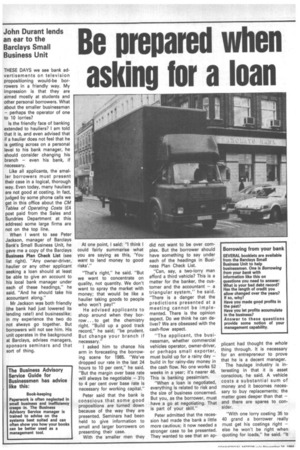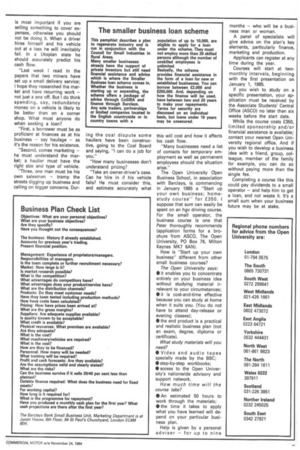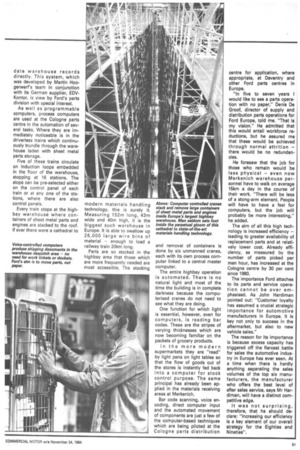Be prepared when asking for a loan
Page 54

Page 55

Page 57

If you've noticed an error in this article please click here to report it so we can fix it.
John Durant lends an ear to the Barclays Small Business Unit
THESE DAYS we see bank advertisements on television propositioning would-be borrowers in a friendly way. My impression is that they are aimed mostly at students and other personal borrowers. What about the smaller businessman — perhaps the operator of one to 10 lorries?
Is the friendly face of banking extended to hauliers? I am told that it is, and even advised that if a haulier does not feel that he is getting across on a personal level to his bank manager, he should consider changing his branch — even his bank, if necessary.
Like all applicants, the smaller borrowers must present their case in a logical, thorough way. Even today, many hauliers are not good at costing. In fact, judged by some phone calls we get in this office about the CM Tables of Operating Costs (£4 post paid from the Sales and Sundries Department at this address) some large firms are not on the top line.
When I went to see Peter Jackson, manager of Barclays Bank's Small Business Unit, he gave me a copy of the Barclays Business Plan Check List (see list right). "Any owner-driver, haulier or any other applicant seeking a loan should at least be able to give an account to his local bank manager under each of these headings," he said. "And he should take his accountant along."
Mr Jackson was both friendly (the bank had just lowered its lending rate!) and businesslike; in my experience the two do not always go together. But borrowers will not see him. His unit operates in the background at Barclays, advises managers, sponsors seminars and that sort of thing. At one point, I said: "I think I could fairly summarise what you are saying as this, 'You want to lend money to good risks'."
"That's right," he said. "But we want to concentrate on quality, not quantity. We don't want to spray the market with money; that would be like a haulier taking goods to people who won't pay!"
He advised applicants to shop around when they borrow...to get the chemistry right. "Build up a good track record," he said; "be prudent. But change your branch if necessary."
I asked him to chance his arm in forecasting the borrowing scene for 1985. "We've dropped our rate in the last 24 hours to 10 per cent," he said. "But the margin over base rate will always be negotiable — 31/2 to 4 per cent over base rate is necessary for working capital."
Peter said that the bank is conscious that some good propositions are turned down because of the way they are presented. Seminars had been held to give information to small and larger borrowers on presenting their case.
With the smaller men they did not want to be over complex. But the borrower should have something to say under each of the headings in Business Plan Check List.
"Can, say, a two-lorry man afford a third vehicle? This is a matter for the banker, the customer and the accountant — a triangular system," he said. "There is a danger that the predictions presented at a meeting cannot be implemented. There is the opinion aspect. Do we think he can deliver? We are obsessed with the cash-flow aspect.
"The applicant, the businessman, whether commercial vehicles operator, owner-driver, or perhaps small exporter, must build up for a rainy day — build in for rainy-day money in the cash flow. No one works 52 weeks in a year; it's nearer 46. This is banking pessimism.
"When a loan is negotiated, everything is related to risk and the size of business concerned. But you, as the borrower, must have a go at negotiating. That is part of your skill."
Peter admitted that the recession had made the bank a little more cautious; it now needed a stronger case to be presented. They wanted to see that an ap plicant had thought the whole thing through. It is necessary for an entrepreneur to prove that he is a decent manager.
The haulage industry is interesting in that it is asset conscious, he said. A vehicle costs a substantial sum of money and it becomes necessary to buy replacements; the matter goes deeper than that — and there are spares to consider.
"With one lorry costing 35 to 40 grand a borrower really must get his costings right — else he won't be right when quoting for loads," he said. "It is most important if you are selling something to cover expenses, otherwise you should not be doing it. When a driver hires himself and his vehicle out at a loss he will inevitably fail. In a Utopian state he should accurately predict his cash flow.
"Last week I read in the papers that two miners have set up a small delivery service; I hope they researched the market and have recurring work — not just a one off. But I do think spending, say, redundancy money on a vehicle is likely to be better than on a corner shop. What must anyone do when seeking a loan?
"First, a borrower must be as proficient at finances as at his business — say haulage — as it's the reason for his existence.
"Second. comes marketing — he must understand the market; a haulier must have the right size and type of vehicle.
"Three, one man must be his own salesman — tramp the streets digging up business and calling on bigger concerns. Dur ing the coal dispute some hauliers have been constructive, going to the Coal Board and saying, "I can do a job for you.
"How many businesses don't understand pricing?
"Take an owner-driver's case. Can he hire in if his vehicle fails? He must consider this, and estimate accurately what this will cost and how it affects his cash flow.
"Many businesses need a list of contacts for temporary employment as well as permanent employees should the situation arise."
The Open University apen Business School, in association with Barclays, is commencing in January 1985 a "Start up your own business; homestudy course" for £350. I suppose that sum can easily be spent on an hgv driving course. For the small operator, the business course is one that Peter thoroughly recommends (application forms for a brochure from ASCO, The Open University, PO Box 76, Milton Keynes MK7 SAN).
How is "Start up your own business" different from other small business courses?
The Open University says: • it enables you to concentrate entirely on your business idea without studying material irrelevant to your circumstances; • it is cost-and-time effective because you can study at home when it suits you. (You do not have to attend day-release or evening classes); • the end product is a practical and realistic business plan (not an exam, degree, diploma or certificate).
What study materials will you need?
• Video and audio tapes specially made by the BBC; • step-by-step workbooks; • access to the Open University's nationwide advisory and support network.
How much time will the course take?
• An estimated 50 hours to work through the materials; • the time it takes to apply what you have learned will depend on your particular business plan.
Help is given by a personal adviser — for up to nine date warehouse records directly. This system, which was developed by Martin Hoogerwerf's team in conjunction with its German supplier, EDVKantor, is view by Ford's parts division with special interest.
As well as programmable computers, process computers are used at the Cologne parts centre in the automation of several tasks. Where they are immediately noticeable is in the driverless trains which continuously trundle through the warehouse laden with sheet metal parts storage.
Five of these trains circulate on induction loops embedded in the floor of the warehouse, stopping at 16 stations. The stops can be pre-selected either on the control panel of each train or at any one of the stations, where there are also control panels.
Every train stops at the highbay warehouse where containers of sheet metal parts and engines are stacked to the roof. If ever there were a cathedral to modern materials handling technology, this is surely it. Measuring 152m long, 43m wide and 40m high, it is the biggest such warehouse in Europe. It is able to swallow up 26,000 large wire bins of material — enough to load a railway train 20km long.
Parts are so stacked in the highbay area that those which are more frequently needed are most accessible. The stacking and removal of containers is done by six unmanned cranes, each with its own process computer linked to a central master computer.
The entire highbay operation is automated. There is no natural light and most of the time the building is in complete darkness because the computerised cranes do not need to see what they are doing.
One function for which light is essential, however, even for computers, is reading bar codes. These are the stripes of varying thicknesses which are now becoming familiar on the packets of grocery products.
In the more modern supermarkets they are "read" by light pens on light tables so that the flow of goods out of the stores is instantly fed back into a computer for stock control purpose. The same principal has already been applied in the materials receiving areas at Merkenich.
Bar code scanning, voice encoding, direct computer input and the automated movement of components are just a few of the computer-based techniques which are being piloted at the Cologne parts distribution centre for application, where appropriate, at Daventry and other Ford parts centres in Europe.
"In five to seven years I would like to see a parts operation with no paper," Denis De Groof, director of supply and distribution parts operations for Ford Europe, told me. "That is my vision." He admitted that this would entail workforce reductions, but he assured me that these would be achieved through normal attrition — there would be no redundancies.
He foresaw that the job for those who remain would be less physical — even now Merkenich warehouse personnel have to walk on average 15km a day in the course of their work. "There will be less of a stong-arm element. People will have to have a feel for computers, but the job will probably be more interesting," he added.
The aim of all this high technology is increased efficiency — leading to greater availability of replacement parts and at relatively lower cost. Already efficiency, as measured by the number of parts picked per man hour, has increased at the Cologne centre by 30 per cent since 1980.
The importance Ford attaches to its parts and service operation cannot be over emphasised. As John Hardiman pointed out: "Customer loyalty has assumed a crucial strategic importance for automotive manufacturers in Europe. It is key not only to success in the aftermarket, but also to new vehicle sales."
The reason for its importance is because excess capacity has triggered off the fiercest battle for sales the automotive industry in Europe has ever seen. At a time when there is hardly anything separating the sales volumes of the top six manufacturers, the manufacturer who offers the best level of after sales service, says Mr Hardiman, will have a distinct competitive edge.
It was not surprising, therefore, that he should declare: "Increasing our efficiency is a key element of our overall strategy for the Eighties and Nineties". months — who will be a business man or woman.
A panel of specialists will give advice on the plan's key elements, particularly finance, marketing and production.
Applicants can register at any time during the year.
Courses will start at twomonthly intervals, beginning with the first presentation on January 1, 1985.
If you wish to study on a specific presentation, your application must be received by the Associate Students' Central Office (ASCO) no later than six weeks before the start date.
While the course costs £350, limited sponsorship and/or financial assistance is available; contact your nearest Open University regional office. And if you wish to develop a business idea with a friend, group, colleague, member of the family for example, you can do so without paying more than the single fee.
Completing a course like this could pay dividends to a small operator — and help him to get a loan, and not waste it. It's a small sum when your business future may be at stake.
































































































